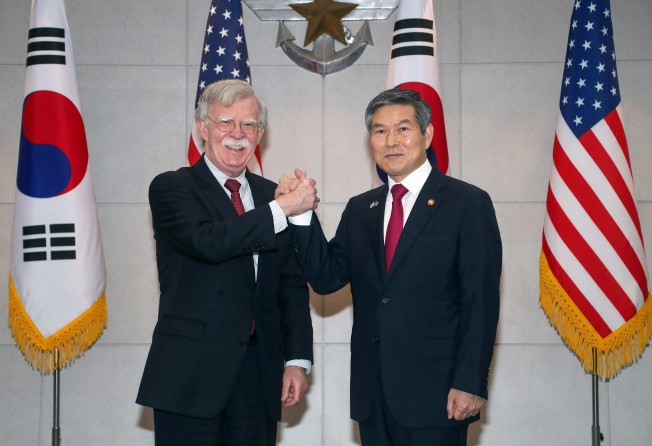US missiles, jittery neighbours and South Korea’s big security dilemma
- Can Seoul find a way out of its political dead end, caught between two powers and increasingly unfriendly neighbours?
- South Korea is in danger of being caught in the so-called alliance security dilemma

Caught between Beijing and Washington over US mid-range missile deployment, Seoul is under tremendous pressure to find a breakthrough out of a political dead end amid its deteriorating relations with Tokyo, Moscow and Pyongyang.
South Korea – which hosts the largest US military base in the world at Pyeongtaek – along with the two other major US allies in the Asia-Pacific region, Japan and Australia, is in danger of being caught in the so-called alliance security dilemma, in which forming a security bloc may hold greater risk than all-round abstention.
The middle power has always been under Beijing’s jittery radar, due to the potential for the United States to target China militarily from its South Korean base – just as Washington feared the deployment of Russian missiles in Cuba during the cold war.
But those concerns have come to the forefront with US withdrawal from the Intermediate-Range Nuclear Forces (INF) treaty – a move widely seen as directed at checking Beijing and Moscow’s military expansion in the Asia-Pacific.
Beijing on Tuesday warned it would take unspecified “countermeasures” if the US deployed ground-based missiles in South Korea and Japan. “I urge our neighbours to exercise prudence and not to allow the US deployment of intermediate-range missiles on their territory,” Fu Cong, director general of the arms control department at China's foreign ministry, said.
A few hours later, US national security adviser John Bolton mentioned Seoul and Tokyo when he said Washington’s plan to deploy intermediate-range missiles in Asia was to protect its regional allies – suggesting the deployment may be made in the two countries.
“We’re talking only about defending our deployed forces, our allies in South Korea, Japan and elsewhere … It’s China that’s built up its military forces and posed a threat,” Bolton said.
While Fu and Bolton traded barbs, Seoul recalled its 2017 nightmare when the US deployed its missile defence system known as Terminal High Altitude Area Defence (THAAD), in the southeastern part of the country as part of its response to the growing North Korean nuclear missile threat.
Beijing protested against the move, saying it would allow the American government to look deep into the mainland and monitor China’s military facilities. Later, it instituted unofficial sanctions against South Korea, including a tourism boycott.
Seoul dismissed speculation on Tuesday it would host US intermediate-range missiles, saying it had received no official request. But experts say Seoul’s dilemma is here to stay.
“[South] Korea depends on China for its economy and on the US for security. It is not in a position to take sides,” Cha Du-hyeogn, a visiting research fellow at the Asian Institute for Policy, said.
“China may see the deployment of the missiles in [South] Korea as the US’ plan to halt China’s economic and military expansion in the Asia-Pacific,” he said, adding that Beijing’s “threat” may be an expression of its discomfort that Seoul is not siding with China for its security.
“But if China has believed that Seoul may lean its security towards Beijing, I can tell you that they are completely wrong … [South] Korea has long said that its alliance with the US would prevail even after unification.”
Indeed, South Korea’s dilemma goes well beyond missile deployment, as it faces other economic and military challenges from Tokyo, Pyongyang and Moscow.
Seoul also faces tremendous pressure from Tokyo, as its attempts to improve relations with decades-long enemy, Pyongyang, have resulted in a weakening of the traditional US-South Korea-Japan alliance.
On Wednesday, Tokyo officially announced the exclusion of South Korea from a shortlist of countries granted streamlined trade procedures with Japan – making Seoul ineligible for fast-track export clearances as of August 28.
The trade row between the neighbouring Asian nations has been fuelled by a renewed dispute over the legacy of Japan’s colonial rule over the Korean peninsula before the end of World War II.
The security of East Asia has been further complicated by the firing of two missiles on Tuesday by Pyongyang, from the western province Hwanghae, in a continuation of its brinkmanship diplomacy.
Director of South Korea’s national security office Chung Eui-yong said in parliament on Tuesday that Pyongyang was not answering direct telephone calls from Seoul. The latest setback in relations on the Korean peninsula came just a day after South Korean President Moon Jae-in proposed the establishment of a “peace economy” between the two Koreas.
“The advantage Japan’s economy has over us is the size of its [overall] economy and the domestic market. If the south and north could create a peace economy through economic cooperation, we could catch up with Japan’s superiority in one burst,” Moon said on Monday.
“Speaking of a ‘peace economy’ seems premature while North Korea aggressively advances its missile capabilities, rejects humanitarian assistance from Seoul, and remains under international sanctions for its lack of denuclearisation,” said Leif-Eric Easley, an associate professor at the Division of International Studies of Ewha University in Seoul.
Easley said South Korea was in a difficult position over the US-China trade war and Tokyo’s retaliation against Seoul’s wartime history claims.
As the increasingly bitter dispute between the US’ key allies intensifies, Russia has also flexed its muscles in the Asia-Pacific. Last month Russian and Chinese long-range military aircraft conducted their first-ever joint air patrol over the Sea of Japan – also known as the East Sea – and the East China Sea.
South Korean politicians are divided on how to find a breakthrough in the geopolitical impasse. While conservatives have called for a restoration of the trilateral alliance, by reviving relations with Tokyo, progressives have emphasised that Seoul must win its battle with Japan.